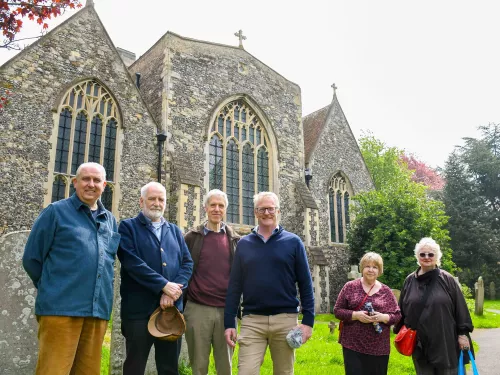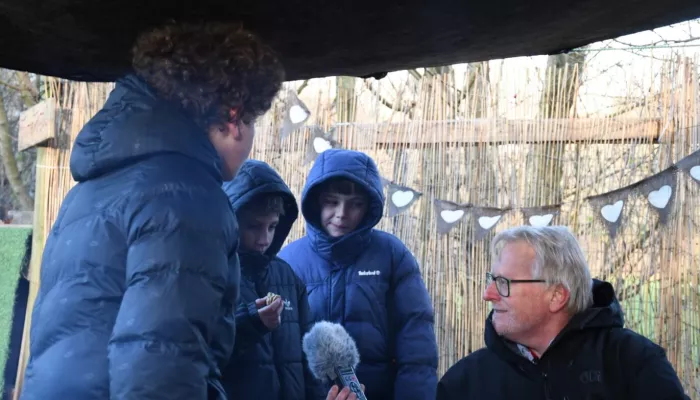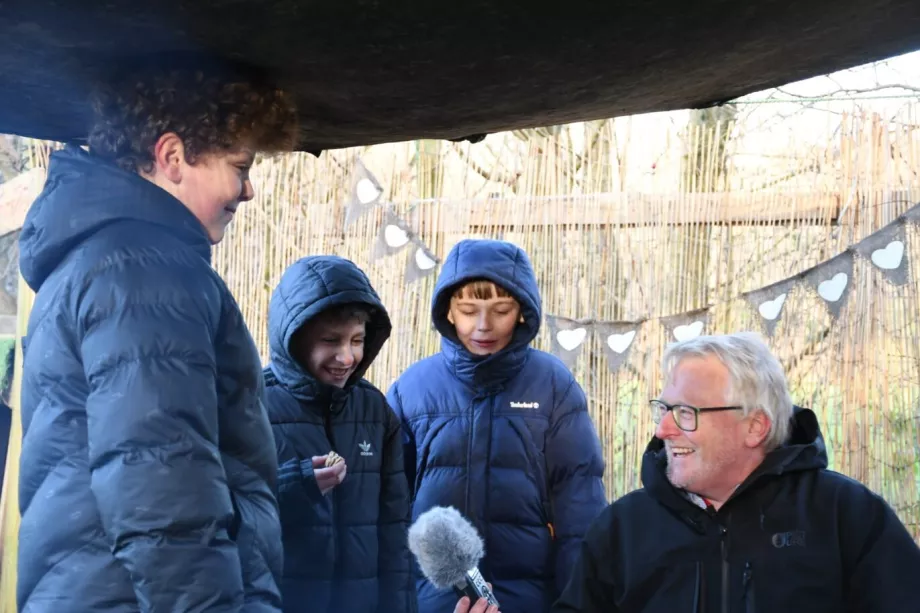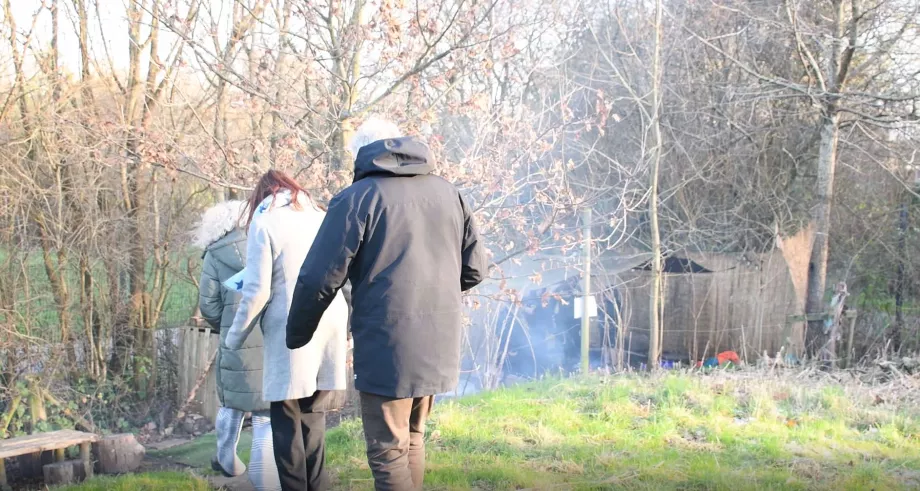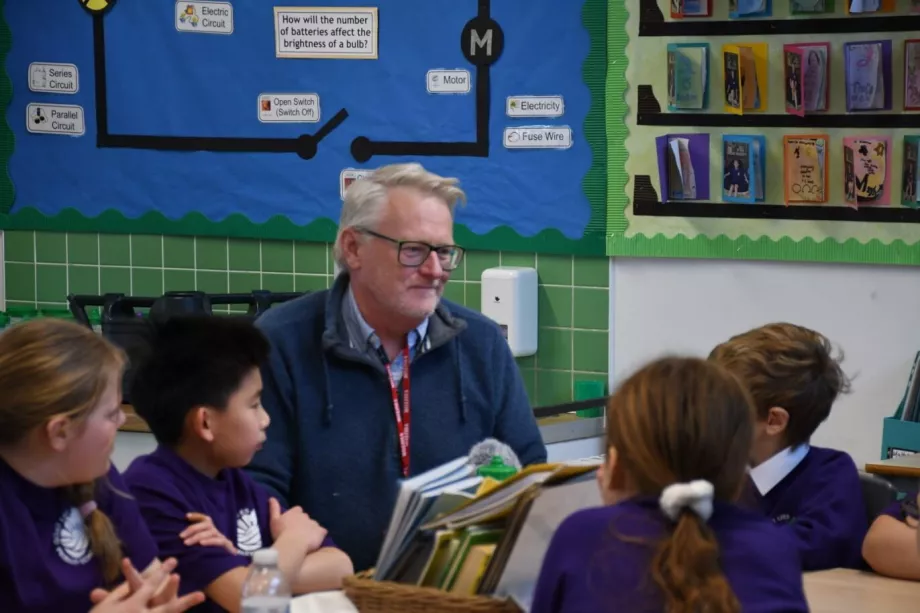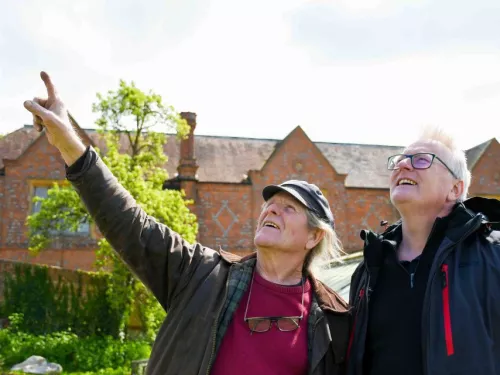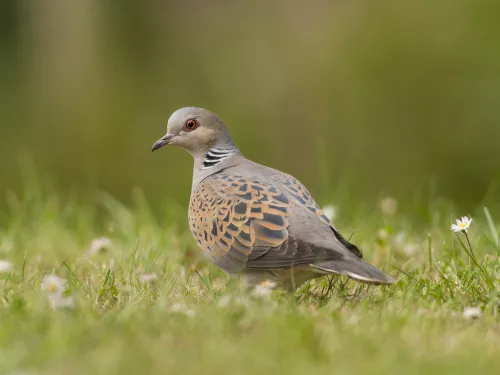Freddy: I'm Freddy and I'm ten years old. In our pond, we have frogs and et cetera.
Rob Smith: Okay, what's your favourite things when you're going outside?
Freddy: The green grass and the blue sky and the air.
Poppy: My name is Poppy and I'm eleven. Well, I am actually in Roots and Shoots, and I really enjoy it. We get to plant stuff. We get to dig up stuff. We've planted a few trees on our field, and we've been to some awards ceremonies, and we've got loads of awards before. And one thing that I really enjoy is kind of spending time with all the people when I'm in Roots and Shoots, because we get to help all of the land across, and we just all plant stuff, and it's just all really enjoying.
Emily: I'm Emily and I'm ten years old. We plant a lot, like, for the bees and everything. We've got our meadow with loads of flowers and everything for the bees, and it's, like, really good. And, as well, we've got birds feeders over there and we see a lot of birds there.
Rob Smith: Why is it important to you that you do this?
Emily: It's because bees are really important as well. And just planting a lot is really much better for the environment than everything else.
Rob Smith: Lillian, what do you like about the nature things that the school does?
Lillian: I like that there are lots of animals and plants, because me and Emily go every day. We fill the bird feeders up for the birds, so they're just at the end of the school, and whenever we go, we see a robin, and it just comes and perches on a branch and watches us.
Rob Smith: We saw the robin. I was just out there a minute ago, and we saw the robin. He came along and followed us. Does the robin have a name? Do you just call him robin?
Lillian: No, we just call him robin. Yeah.
Oscar: I'm Oscar and I'm eight.
Rob Smith: Is it important to you all the wildlife stuff that the school does?
Oscar: Yes.
Rob Smith: Why?
Oscar: Because I want the next generation to have as much nature as we have now. And I hope that all the animals that we have don't go extinct so the next generation can see all the animals.
Rob Smith: Clearly. Having had a chat with some of the kids, they have all really bought into it.
Andrea de Roeck: Yeah, absolutely, they have. I think the children who have left, the ones we had during lockdown, were the children who really started it off with us, because we had the opportunity, with half a class, to actually get outside and build some of the areas that we've developed. Those children then took it to other classes and told them why it was important. And to be honest, the children will listen to children more than they will the adults. So, if the older children are saying, you need to look after this area because of the animals that live there, they'll take more notice of them than us. So that had a really big impact.
Rob Smith: And for you personally, what does it mean, the fact that the school is doing this now? You know, you've been teaching for a few years. Is this the first kind of project that you've seen develop like this and has it kind of made a difference to you?
Andrea de Roeck: Absolutely. Yeah. I think for me it's knowing that although we only have these children for a short space of time, these children can have a bigger impact as they go off. And I feel we've done something really important, and that legacy hopefully will stay with them as they go through into adulthood as well. You know, they can take Roots and Shoots into their secondary school if they want to.
So, you never know, we might have a couple that take it to their next secondary schools that have never heard of it and then carry it on there and can reach more children there as well.
Rob Smith: So how long have you been involved in education?
Elaine Paggett: Just over 20 years.
Rob Smith: And put it into a bit of context, how important to you is what you've done here over the last couple of years in comparison to all the stuff you've done before?
Elaine Paggett: Oh huge. Huge. To be honest, I don't think I've been in a school before that has given me such free rein and such support to go for it and whatever I come up with and say, “what about this?” They're like, “Absolutely, let's go for it” and back me 100%. And obviously I have Andrea that always supports me and helps me. That is immense. That makes such a huge difference. You know, I've been at another school where it's very restricted or “we can't do that” or possibly “that doesn't really fit in with what we're doing”. While, as Andrea said, we've changed the curriculum, so actually we can fit it in because we think it's so important, we're going to change to suit your needs. And so that makes a huge difference.
Rob Smith: And what sort of responses have you had from parents?
Elaine Paggett: Again, huge. And parents are saying about their children's learning and just their wellbeing and how happy they are and they're so supportive of whatever we put forward. They want to join in, and they want to help and whether it's raising money for the toilets we need because it's not just about here. You know, we look at other countries as well and how we can support other communities, and they just are so supportive. Whatever we ask of them, they all pull together and that's what makes Goat Lees, Goat Lees, I think.
Rob Smith: And as a final thought, there may well be other teachers, other schools listening to the podcast at some point. What advice would you give to them?
Elaine Paggett: Don't be afraid, actually. Don't think “money”. You know, lots of people that I've spoken to where I've gone to other groups and meetings and they said, “Well, we haven't got the money”. It's not about the money. Time: having the time and not sort of giving up when it sort of looks a bit difficult. But there's always ways round things, but money is not the issue. It's the time, but it's worth it. And you're passing on that love to the children of looking after our planet. I just think it's very important, so don't be put off. It's a lot of work, but it's definitely worth it. And if you've got a team behind you as well, that makes a huge difference. And you'll be surprised at how many people will come forward to offer help, because I think a lot of people feel the same and they all want to help.
Rob Smith: Excellent. It's clearly a very happy place. There's clearly a lot of people enjoying themselves here. It's inspiring to see both of you. Thanks ever so much for your time.
Andrea and Elaine: Thank you very much. It's lovely to meet you.
Rob Smith: Clearly. Having had a chat with some of the kids, they have all really bought into it.
Andrea de Roeck: Yeah, absolutely, they have. I think the children who have left, the ones we had during lockdown, were the children who really started it off with us, because we had the opportunity, with half a class, to actually get outside and build some of the areas that we've developed. Those children then took it to other classes and told them why it was important. And to be honest, the children will listen to children more than they will the adults. So, if the older children are saying, you need to look after this area because of the animals that live there, they'll take more notice of them than us. So that had a really big impact.
Rob Smith: And for you personally, what does it mean, the fact that the school is doing this now? You know, you've been teaching for a few years. Is this the first kind of project that you've seen develop like this and has it kind of made a difference to you?
Andrea de Roeck: Absolutely. Yeah. I think for me it's knowing that although we only have these children for a short space of time, these children can have a bigger impact as they go off. And I feel we've done something really important, and that legacy hopefully will stay with them as they go through into adulthood as well. You know, they can take Roots and Shoots into their secondary school if they want to.
So, you never know, we might have a couple that take it to their next secondary schools that have never heard of it and then carry it on there and can reach more children there as well.
Rob Smith: So how long have you been involved in education?
Elaine Paggett: Just over 20 years.
Rob Smith: And put it into a bit of context, how important to you is what you've done here over the last couple of years in comparison to all the stuff you've done before?
Elaine Paggett: Oh huge. Huge. To be honest, I don't think I've been in a school before that has given me such free rein and such support to go for it and whatever I come up with and say, “what about this?” They're like, “Absolutely, let's go for it” and back me 100%. And obviously I have Andrea that always supports me and helps me. That is immense. That makes such a huge difference. You know, I've been at another school where it's very restricted or “we can't do that” or possibly “that doesn't really fit in with what we're doing”. While, as Andrea said, we've changed the curriculum, so actually we can fit it in because we think it's so important, we're going to change to suit your needs. And so that makes a huge difference.
Rob Smith: And what sort of responses have you had from parents?
Elaine Paggett: Again, huge. And parents are saying about their children's learning and just their wellbeing and how happy they are and they're so supportive of whatever we put forward. They want to join in, and they want to help and whether it's raising money for the toilets we need because it's not just about here. You know, we look at other countries as well and how we can support other communities, and they just are so supportive. Whatever we ask of them, they all pull together and that's what makes Goat Lees, Goat Lees, I think.
Rob Smith: And as a final thought, there may well be other teachers, other schools listening to the podcast at some point. What advice would you give to them?
Elaine Paggett: Don't be afraid, actually. Don't think “money”. You know, lots of people that I've spoken to where I've gone to other groups and meetings and they said, “Well, we haven't got the money”. It's not about the money. Time: having the time and not sort of giving up when it sort of looks a bit difficult. But there's always ways round things, but money is not the issue. It's the time, but it's worth it. And you're passing on that love to the children of looking after our planet. I just think it's very important, so don't be put off. It's a lot of work, but it's definitely worth it. And if you've got a team behind you as well, that makes a huge difference. And you'll be surprised at how many people will come forward to offer help, because I think a lot of people feel the same and they all want to help.
Rob Smith: Excellent. It's clearly a very happy place. There's clearly a lot of people enjoying themselves here. It's inspiring to see both of you. Thanks ever so much for your time.
Andrea and Elaine: Thank you very much. It's lovely to meet you.
Rob Smith: Andrea de Roeck and Elaine Paggett there. And thanks especially to all the children at Goat Lees Primary School as well. It was great to meet you all. And if you know of a school or a business or indeed a community group that's doing something amazing for wildlife, the 2024 Wilder Kent Awards are now open for nominations. Just take a look at the website to get all the details.
Now it's time as we get towards the end of the pod for the latest news. And the top story this month is the arrival of another bison calf at the Blean. Now, while the first calf that was born last year was a total surprise, this one was slightly more anticipated. The rangers had noticed that the 19-year-old matriarch of the herd had changed her behaviour slightly and calf number two arrived as, quote, “The best Christmas present for the project”. It means that there are now six bison in the woods in total outside Canterbury. And with big plans to install bison bridges to allow the animals to safely roam over the full 200 hectares of land, we're going to be bringing you lots more of the project in the months to come.
It's all part of the post Brexit changes, which mean cross-compliance rules that farmers had to follow in order to get rural payments no longer apply. That means now farmers could cut down hedges in spring and summer and risk harm to nesting birds. It could mean more farm pollution and soil can be washed into rivers. Rosie Hails from the National Trust says that for the benefit of nature and to give farmers clarity, it is vital that DEFRA addresses this regulatory gap with urgency. All the bodies are urging people to write to their MP to press for action.
And, it's not all always about being green. Sometimes being blue is good too. The Ernest Cook Trust has pledged £60,000 to help encourage Blue Influencers in Dover and Folkstone, aimed at encouraging 10 to 14 year olds to create and run social action schemes to improve their environment over the next three years. The money's going to help pay for a blue mentor through the Kent Wildlife Trust to set things up. Ed Ikin from the Ernest Cook Trust says that young people are often the most passionate about the environment and are very aware of the issues we face with climate change.
The Blue Influencer scheme will give them the funding, platform, and tools they need to make positive changes to benefit their entire community. Amen to that. Well, that's all for this episode of Talk on the Wild Side. I just want to say a special thanks to Natasha Aidinyantz for her invaluable help in getting everything set up. Without that, none of it would happen. So, thank you very much, Tash. I'm Rob Smith. This has been a Wild Rover Media Production, and until next time, do go wild in the country.
